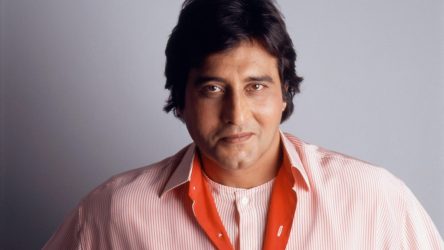(BBC) Vinod Khanna, who has died aged 70, belonged to the second wave of Punjabi heroes who ruled Bollywood – known as “Partition Punjabis”.
His family hailed from Peshawar in Pakistan and had moved to India in 1947 when the country was divided.
The heroes on screen then were all swashbuckling heroes known for their strapping good looks, cultivated on screen mannerisms and individual styles.

He embodied all that but also brought all the panache of 1970s cinema to his acting.
Khanna graduated from college in Mumbai but had been seduced by the movies since school and soon started concentrating on acting full time.
He made his film debut in 1968 with Man ka Meet.
Film writer Jai Arjun Singh points out that “Khanna’s Bollywood path was unusual for his times”. He was the first modern Bollywood hero who started out by playing negative characters.
“Khanna’s villainy was impressive as it combined his dashing looks with an edgy dangerous menace that made him impressive on screen. He was better at playing villain parts than the conventional Bollywood hero”, says Singh.
If Dharmendra was the original “beefcake of Bollywood” in the 1970s, the 1980s was dominated by the figure of Amitabh Bachchan’s “angry young man”.
But Mr Singh says there was a time when Bollywood watchers “predicted that Khanna was a threat to superstar Bachchan’s popularity”. The two acted in a number of films together.
In Amar Akbar Anthony, one of Bollywood’s biggest hits ever, a scene has Khanna beating Bachchan to a pulp and carting him over his shoulders. It left many fans of the superstar dumbfounded.
“It was inconceivable for me to imagine my hero getting beaten. Even by his elder brother in the film,” writes Diptakirti Chaudhuri, in a book on Bollywood.
Khanna was a hunk with dreamy eyes and the combination of his muscularity and good looks helped him race to the top.
He did action, thrillers, and romances and, for a while, ruled the marquee in Bollywood.
His noteworthy films include Mera Gaon Mera Desh, Gaddar, Imtihaan, Muqaddar ka Sikander, Inkaar, Amar Akbar, Antony, Qurbani, Kudrat, Dayavan among others.
But in the 1980s, Khanna, by then a family man and top hero, gave up acting in films to retire to an ashram run by Rajneesh, a maverick spiritual guru, popular with westerners, in the western Indian city of Pune.
The tabloids called him “Sexy Sanyasi”, referring to an ascetic follower of Hinduism.
“I am, I guess, a human being who does what feels right to him at the time, does what he really wants to do,” he once told a journalist who asked him whether he was a star or a sanyasi.
“Sure, it is easy to latch onto one thing, to be and do that all your life – but within you is a voice saying there must be something more to life. I look for that something more.”
After his return from the ashram, his marriage ended and he went missing from popular imagination.
But he went on to remarry and gradually returned to acting at his own pace. Much later, in 1997, he joined politics – subsequently getting elected to parliament four times. He was once made a junior foreign minister.
Khanna is survived by his wife, daughters and sons.
He will be forever remembered as an actor who wrote his own jagged script.





